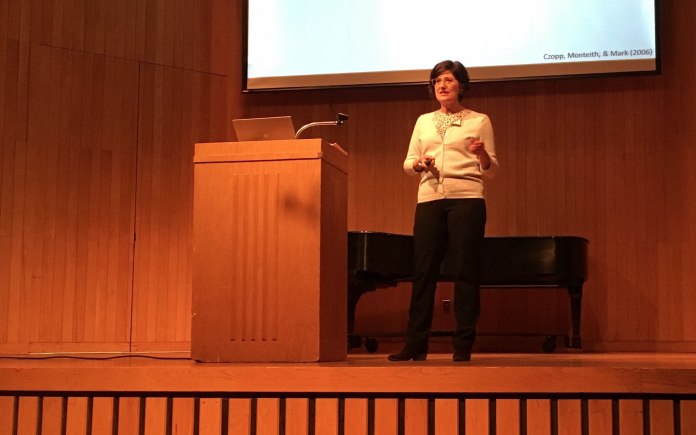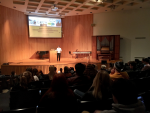
A father and his son were out driving and they got into a terrible accident. The father was killed and the son was rushed to the hospital. The surgeon comes in, takes one look at the boy and says, “I can’t operate on this boy; he is my son.” How could this be?
Dr. Margo Monteith, a psychological sciences professor at Purdue University, said she was stumped by this riddle when she first heard it. “The surgeon is the mother! The first time I heard this riddle, I was in grad school studying stereotyping and prejudice, and thought the ‘father’ in the car was actually a priest. Other kids have said it’s a gay couple,” Monteith said. “This just goes to show how much societal stereotypes provide a lens through which we see the world... and the way we see people.”
Monteith, part of DePauw University’s Spring 2018 Psychology Speaker Series, used the riddle to emphasize the findings of her research during the presentation, “Standing up for change: Reducing Stereotypes and Prejudice through Interpersonal Confrontation,” on March 8 at 6 p.m. in Thompson Recital Hall.
Monteith and her research team explored the effectiveness of confrontation when reducing race and gender biases. Monteith said she felt her research was applicable in light of current events, as movements like the #BlackLivesMatter and #MeToo gain more attention.
When research participants were presented with photos that were likely to prompt biased reactions, Monteith's team “found that whites usually responded with stereotypic responses.”
After participants were confronted about their stereotypic responses, Monteith said that it didn’t matter how the confronter handled the situation.
“The very simple message of this study is that confrontation appears to work at reducing biases. Whether people were confronted in a high-threatening or low-threatening way, they reduced their biases to the same extent,” Monteith said.
Sexism, however, presents a different set of problems, according to Monteith. “In general, people think they hold favorable beliefs about women, even if those beliefs are restrictive. People perhaps do not think sexism is a problem.”
Monteith’s team found that participants had to not only be confronted, but also given evidence of their sexism, in order to recognize and reduce their sexual biases. “Confrontation of sexism appears to be a unique case that requires presentation of evidence and the harmful consequences of those biases.”
Monteith further explored if it mattered who confronted the participants. In the case of sexism, she found that participants dismissed the confrontation no matter the gender of the confronter. In terms of racism, research showed that an African American confronter was seen as a complainer who was “playing the race card.”
She said, “I don’t mean to suggest members of target groups are ineffective...it’s just that when it comes from a person of the same race, people are less likely to label the confronter as a complainer. A lot of times, allies think they shouldn’t speak up, but this shows ...they’re likely to be effective.”
Armed with the results of her research, Monteith hopes people will speak up when they encounter biases. “Staying silent is not golden and it’s also not promoting positive change,” Montieth said. “Rather than staying silent, I encourage everyone to confront bias when you do see it.”





